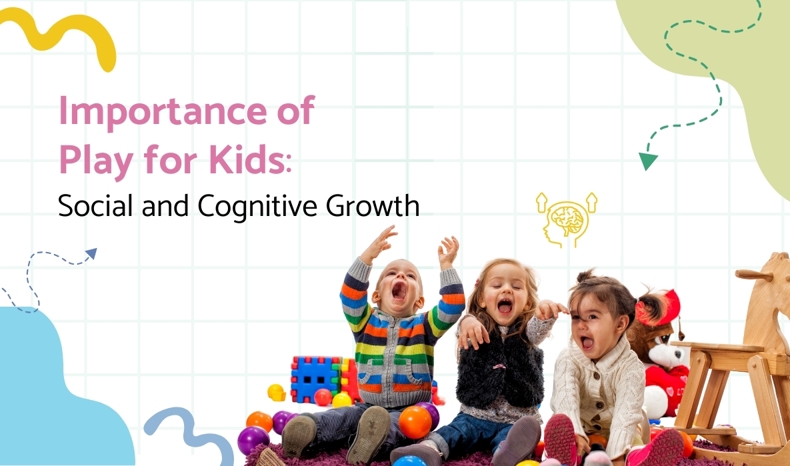Importance of Play for Kids: Social and Cognitive Growth
Play is more than just a fun activity for children, they not only gain amusement; it enhances their growth holistically. Children learn about the world by playing and subsequently acquire critical social and creative skills. From sharpening cognitive skills to building emotional resilience, the importance of play in a child's life can never be overstated. This blog explores and explains how play impacts a child's social and cognitive development, and why it must be an integral part of their daily lives.
Understanding Play: What It Really Means for Kids
Play is any activity that children engage in voluntarily, driven by curiosity and enjoyment. Play can help children take part in fun activities that are essential for their growth and serves as a foundation for healthy cognitive and creative development. Play enables children to express creativity, build relationships, solve problems and enhance their physical and mental well-being. Here are different types of play children can indulge into:
- Free Play: Undirected activities that involve only playing with toys or running around outdoors.
- Structured Play: Structured games like board games or team sports.
- Pretend Play: Role play and imaginative games similar to playing house.
- Physical Play: Activities like running, climbing, and dancing develop physical fitness.
The importance of play in early childhood lies in its ability to support growth across multiple domains—physical, emotional, cognitive, and social.
How Play Shapes Your Child's Development
Play is a cornerstone of a child's development. Here’s how it supports key areas:
- Social Development: This teaches children to play together, share, and conclude their conflicts with each other. Children learn how to get along sociably with one another and become friends through playing games together.
- Cognitive Growth: Involvement in playing puzzles and building blocks boost the ability to solve issues, think critically, and memorize.
- Emotional Regulation: It is through pretend play that children process their emotions, experiment with situations, and develop empathy.
- Creativity: Creative games stimulate thinking outside of the box and inspire innovation for example, making clay sculptures.
Unlocking the Science Behind Learning Through Play
Scientific studies have thrown considerable weight behind the importance of play in a child's overall well-being and growth. Through play, children engage in active learning that involves key processes such as:
- Scaffolding: Caregivers and peers intervene in settings where children can master skills that are slightly out of reach for them.
- Problem-Solving: Games and challenges not only stimulate the minds but also require logical thinking and decision-making.
- Creativity: Pretend play and free play both enhance creativity and flexible thinking.
When kids make a tower with blocks, they are testing balance, design, and gravity. They learn complex functions through the simplest, fun actions.
Role of Play in a Child’s Life
Different types of play contribute uniquely to a child’s development.
Builds Strength and Stamina
Physical activities such as running, climbing, and jumping refine one's ability and develop new motor skills, fostering coordination, and endurance. It also encourages a healthy lifestyle as well as helps combat obesity in childhood.
Builds Essential Social Skills
Children participate in group games which train them on how to express themselves, work together with other children, and ultimately be good team players. These are therefore the best activities to help mold an individual's lifetime social skills.
Conclusion
Play is an important part of children's life helping them grow physically, socially, cognitively, and emotionally. It is where different modes of play can help children lay the groundwork upon which they can build healthy development when parents and educators can build on them.
We, at Play N Learn recognize the importance of play in childhood and offer a nurturing environment that combines fun and learning, ensuring children thrive in all aspects of their development.
FAQs
1. What is the importance of play in children's social development?
Children learn how to share and cooperate, as well as how to sympathize with others through play. In group activities, children learn how to come into contact with others, settle a dispute, and develop relationships.
2. How does play contribute to cognitive growth in early childhood?
Play serves to exercise problem-solving, memory, and critical thinking; games and activities present challenges to thinking logically, decision-making, and adjustments to new situations.
3. Why is play considered essential in child development?
Play supports holistic growth, including physical health, emotional resilience, and intellectual development. It creates a balanced learning experience for children.
4. What are some theories that explain learning through play?
Theories like the scaffolding of Vygotsky emphasize social interaction in learning, and Piaget's stages of play show cognitive development in different aspects.
5. How can different types of play help children develop physical health and social skills?
Physical play improves strength and coordination, while interactive play fosters communication and cooperation, both of which complement each other as part of a balanced development approach.





